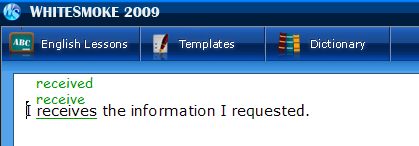Subject-Verb Agreement - Common Errors in English
Subject-verb agreement is probably the hardest part of the English language to master for new learners. Here we go over the essentials of subject-verb agreement in English, and show you how WhiteSmoke works to detect and correct agreement errors in sentences.
About Subject-Verb Agreement
The key to subject-verb agreement is matching the number of both; singular subjects take singular verb forms, as plural subjects take plural verb forms. The trick is (1) to recognize singular v. plural subjects, which is not always easy (an “s” at the end of a word is not the only sign of subject plurality), and (2) to know the difference between singular and plural verb forms.
Subject-verb agreement can be difficult due to the irregularity of English plural subjects; many are not marked with an “s” at the end. Even for native-English speakers, subject-verb agreement can be a difficult concept to grasp. There are several rules to follow, and some of them just require practice so that they become familiar.
Some Subject-Verb Agreement Rules
(According to Strunk & White’s The Elements of Style (Allyn & Bacon, 2000))
- Use singular verb forms after the following: Each, either, everyone, everybody, neither, nobody and someone.
i.e. Everybody tries to make a good first impression. - “None” has both singular and plural forms. The singular verb form is used when “none” means “no one” or “not one”. The plural is used when “none” implies more than one thing or person.
- i.e. None of us thinks what she said is correct.
- i.e. None of the local teams are making it to the second round in the tournament.
- A compound subject - formed by two or more nouns and the word and- usually requires a plural verb.
i.e. The teacher and the student were working on subject-verb agreement. - A singular subject remains singular, if connected with the words with, as well as, in addition to, except, together with, and no less than.
i.e. Her attitude as well as her appearance is inappropriate.
Fixing Subject-Verb Agreement Problems with WhiteSmoke
Problem #1: "I receives the information I requested."
Whitesmoke’s Suggestion(s):

Whitesmoke’s Explanation:
“The subject and verb have to agree in number and person. Singular nouns in the subject require the singular form of the verb (either in the first or the third person), whereas plural nouns require the plural form of the verb.” (A correct assessment of the error.)
Problem #2: "Painting are a fun hobby of mine."
Whitesmoke’s Suggestion:

Whitesmoke’s Explanation:
“The subject and verb have to agree in number and person. Singular nouns in the subject require the singular form of the verb (either in the first or the third person), whereas plural nouns require the plural form of the verb.” (A correct assessment of the error.)
Problem #3: "Everyone at the meeting are responsible for a presentation."
Whitesmoke’s Suggestion:

Whitesmoke’s Explanation:
“The subject and verb have to agree in number and person. Singular nouns in the subject require the singular form of the verb (either in the first or the third person), whereas plural nouns require the plural form of the verb.” (A correct assessment of the error.)



